"Have a dream that goes beyond what exists, rather than fixing what exists.” - David Kelly, Ideo
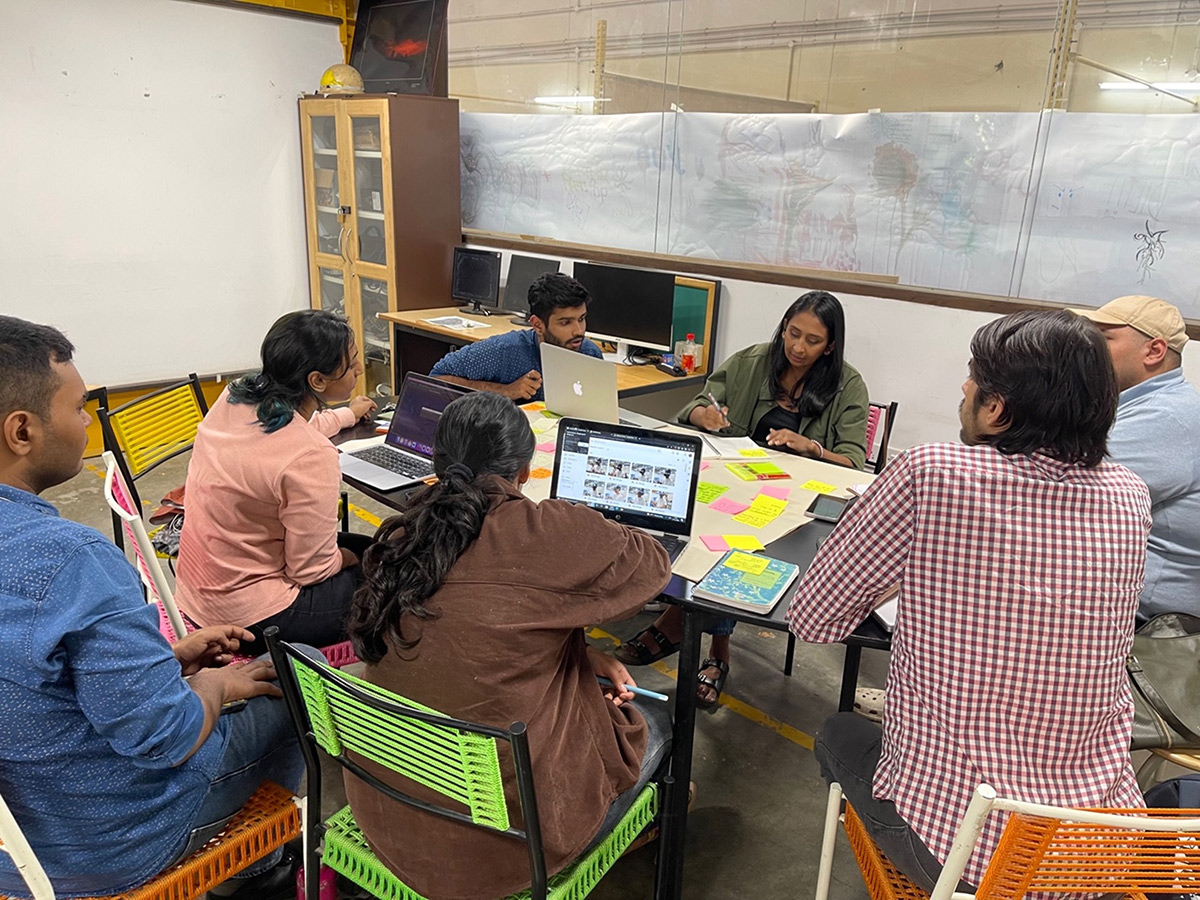
Ideation Exercise.
Vision
The vision of Postgraduate Program in Design Led Innovation is to create innovators who will explore and apply the understanding of creative and original thinking through deeper exploration of human behavior, socio political context, environmental impact, business strategy and technology.
This vision has evolved through critical understanding of multiple theories and frameworks proposed by academicians and practitioners. One such popular Design Led Innovation framework developed by Sam Bucolo, Cara Wringley and Judy Mathews is adopted to explain the underlying objective of this course. The framework was developed to assist organizations who have the desire to grow through opportunity mapping and embedding strategic value of design within their operations. The concept acknowledges that within any business a continuum exists between operational and strategic activities, and these activities have both internal and external focus.
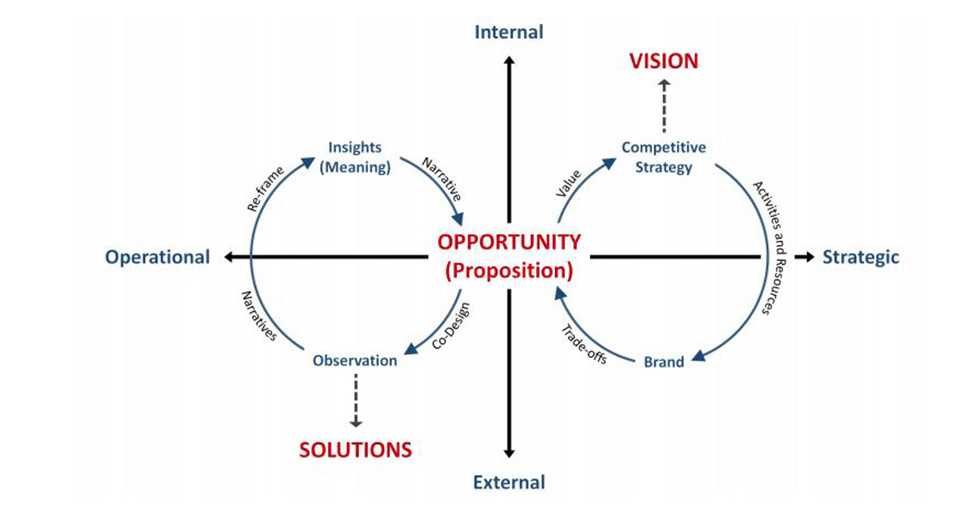
Design Led Innovation Framework (Adapted from Bucolo et al., 2012).
At Srishti Manipal, Design-Led Innovation concentrates on innovative interventions in a social or a business context. We think of Design-Led Innovation not just as “design driven” in its traditional sense, but more about “designing for emerging usages and technologies” to project and foresee what can be. We believe that a true multidisciplinary space is a key to nurture creativity and innovation. The program guides an individual towards creating innovative and sustainable intervention with the potential to drive positive change in an organization or society.
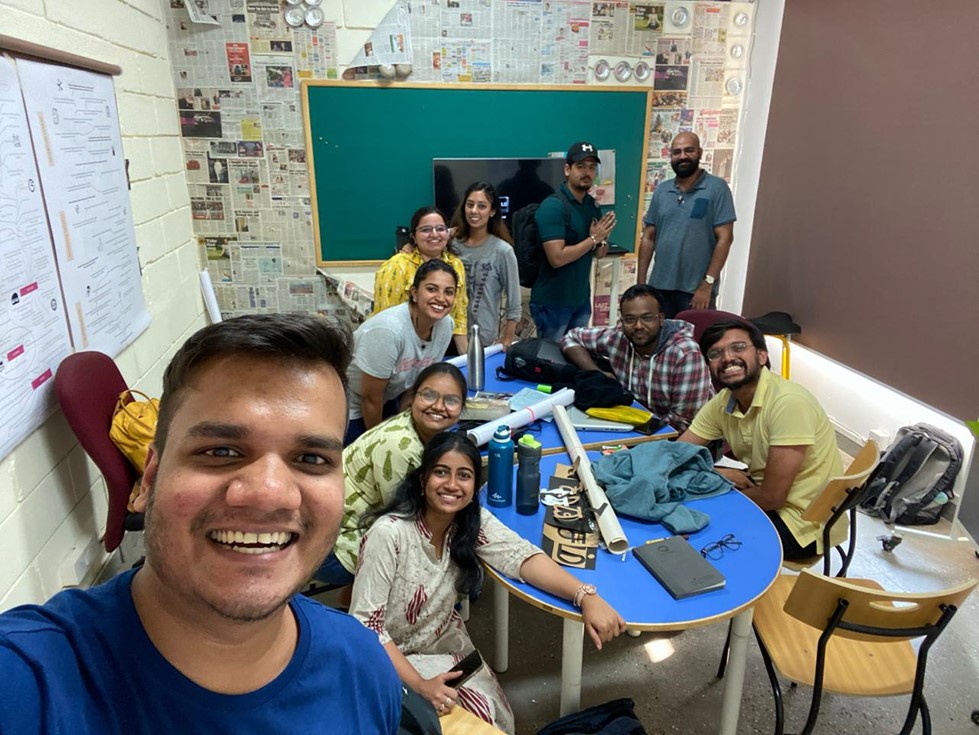
Class Activity.
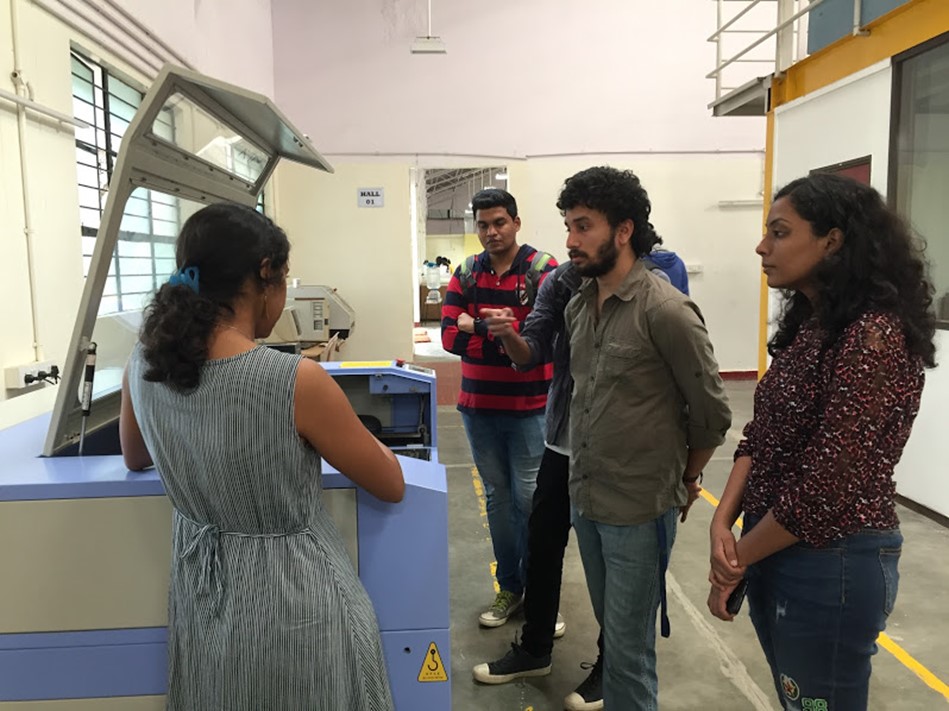
Maker’s space.
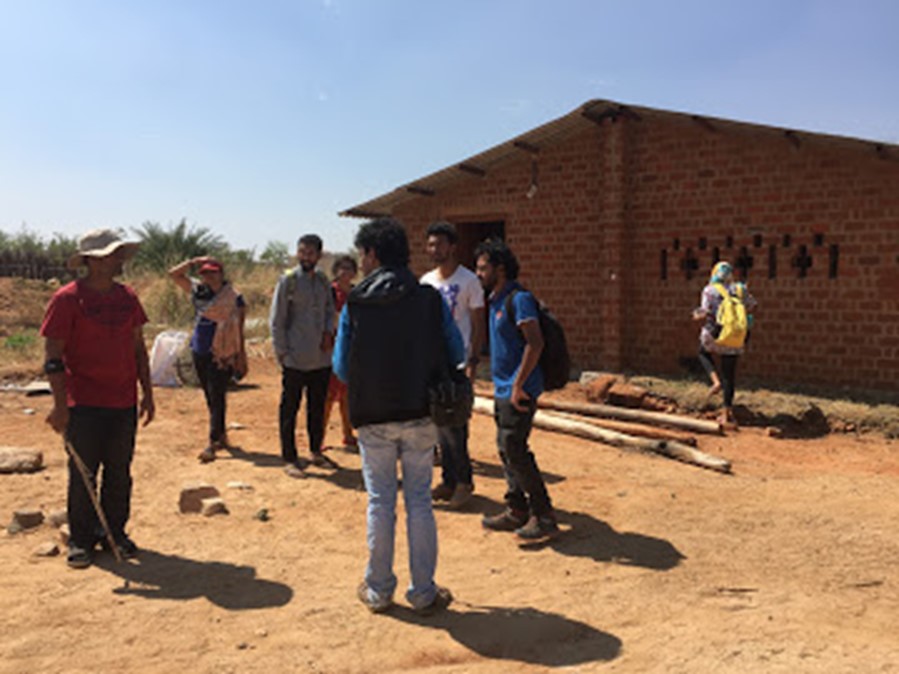
Community Engagement.
Learning Approach
Learning at the postgraduate level is driven by published lines of inquiries that is enacted through studio-based learning, workshops, theoretical reflections and field work. This approach cultivates a creative practice through engagement in diverse contexts, collaborative and participatory approaches leading to knowledge development.
Program learning components include:
- A theoretical and historical knowledge of philosophies and methods of business, enterprises, innovation and economics and their limitations.
- Methods of Hands-on and critical making as means of research and design.
- Methods of speculative and participatory creativity and research.
- Frameworks and methodologies of ethical perspectives and self-reflexivity within and questioning limits of Design & Innovation.
Capability Sets
Upon successful completion of the course, graduates will have the capabilities to:
- Blend and Synthesize - Able to blend and synthesize knowledge around business, design and technology.
- See and Connect - See, Connect and consciously unearth through combination of diverse experiences and knowledge forms.
- Creative Thinking - Ability to invent or develop a novel idea or create something new.
- Critical and Analytical Thinking - Critically analyse primary and secondary information and strategically position one’s idea and intervention.
- System Thinking - Able to think at a system level.
- Opportunity Mapping – Able to identify opportunity in a given space through system level thinking and impact analysis.
- Build and Make - Build and make to strongly link between design and innovation.
- Responsible & Resilient - Be responsible and resilient while exploring an idea or intervention for change to scale.
Opportunities
The The above-mentioned capabilities equip and prepare the student for a wide range of opportunities across,
- Design Studios
- Research and Development Labs
- Public Sector Units
- Startup Organisations
- Small and Medium Enterprises
- Large Enterprises
- Non Government Organisations
- Social Enterprises
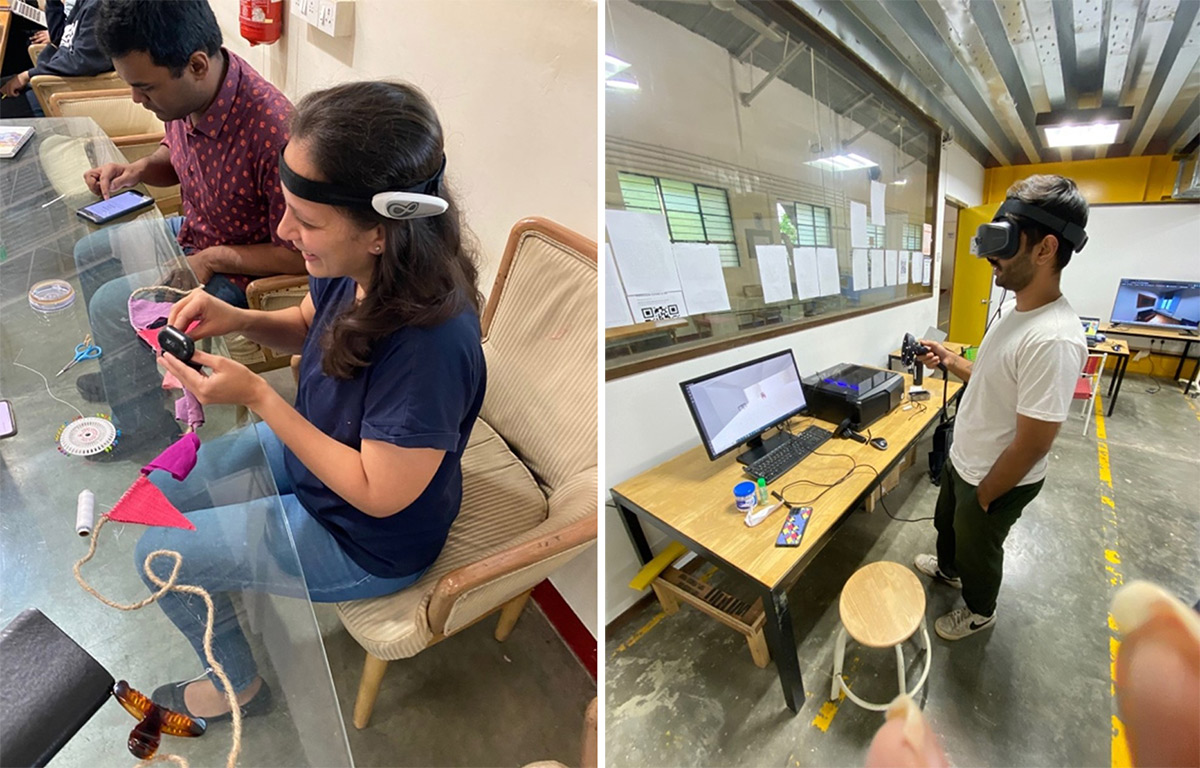
Research Lab Activities.
We anticipate the graduates of this course to work in the following job roles,
- Innovation Consultant
- Design Researcher
- Strategic Business Designer
- Product or Service Designer
- Product Manager
- System Designer
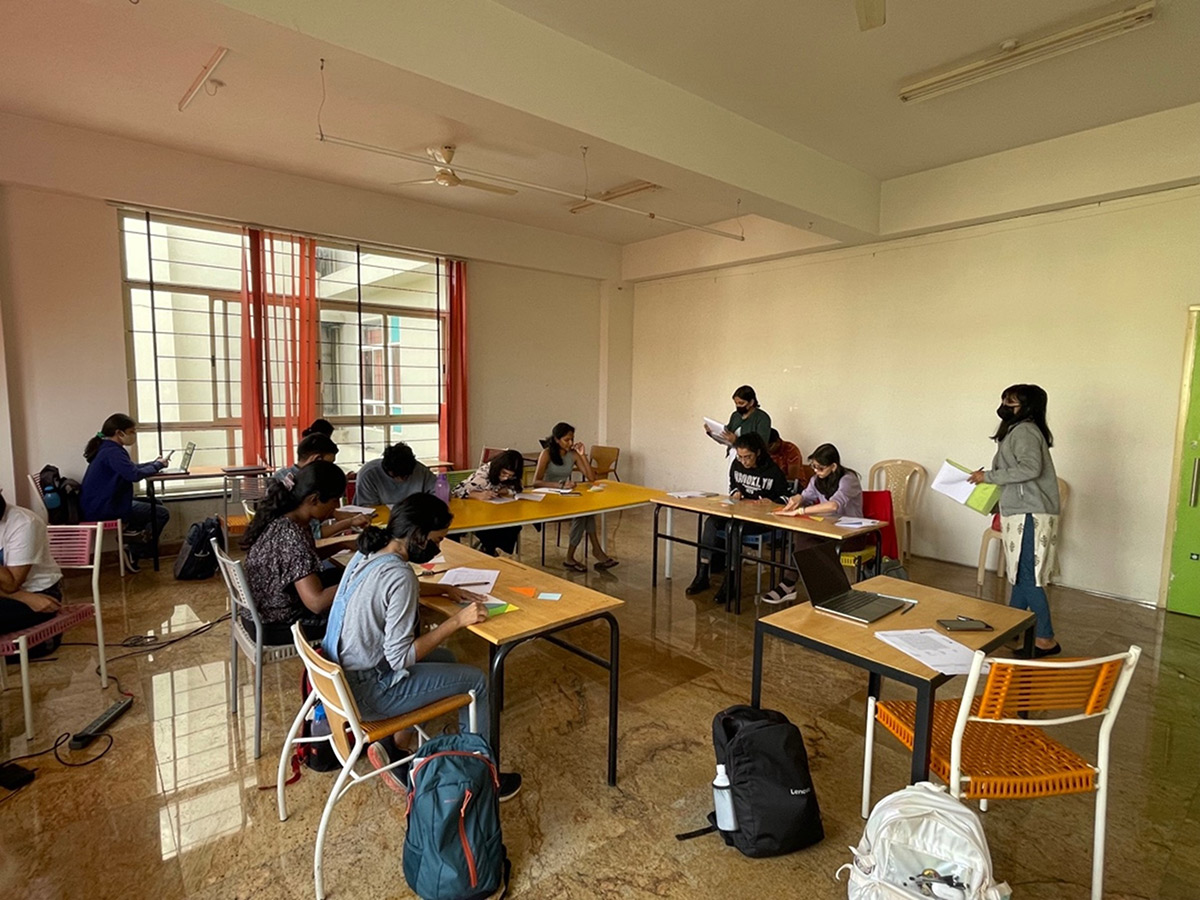
Experiments Conducted In A Studio Environment.
We also encourage and mentor on independent development of an idea towards a potential entrepreneurship venture. As well as foster a space to choose academic pathway and plan for a research-oriented career through pursuing a PhD.
People
Enquiries

Disciplinary Intersections
The program is informed by the following learning disciplines:
Humanities
Cognitive Psychology
Cultural Studies
Entrepreneurship
Furniture Design
Information Technology
Product Design
Service Design
Sociology
System Design
User Experience Design
Research and Collaboration
The students under this program will have the opportunity to work with the following centers and labs at Srishti.
Frugal Design DESIS Lab
Impact Edge
Srishti Labs (S.Labs)
FAQs
The term “design” is often used in literature to describe a wide range of activities, most of which are planned actions towards a preferred outcome, which could be a product, system or service. Similarly “innovation” is often used to describe both activities and outcomes. However design is often not used to describe the ‘value’ it provides to an organization and more importantly the ‘value’ it provides to existing and future consumers. Design Led Innovation (DLI) bridges this gap. DLI is a process of creating a sustainable competitive advantage, by radically changing the value proposition for a product or service.
Design enhances the outcomes of numerous innovation activities in an organization through quality enhancement, production improvement, resource optimization, finding new opportunities, exploring possibilities of new technologies, etc. Design brings in new and creative ways of thinking to tackle wicked problem areas and helps to unpack complexity. Industry and governments alike across the world are adopting concepts from the discipline of design to facilitate their innovation process and generate competitive advantages in the global market place. A Design Led Innovation approach facilitates alignment of organizational ideologies and potentially leverages its internal capabilities and resources, critically analyze or modify existing business or operational model in order to generate innovative solutions to create competitive advantage.
If you are person who want to create unique groundbreaking products and services or organizations, collectives or enterprises that will significantly impact lives of people, then Design led Innovation is right for you. If you are open minded, can align with contentious matters of concerns of users & stakeholders, can embrace diversity, and think holistically, then you are suitable to become a design led innovator. Design led innovation is right for you if you are interested in working in multi-disciplinary teams, generate new ideas, and develop alternative solutions to make an impact.
You will work with designers, artists, anthropologists, technologists, entrepreneurs, and other professionals who are constantly pushing the boundaries of design led approaches to innovation across public and private and not-for-profit settings. The program will better inform your ability to research and analyse at a system level, imagine diverse and just futures, while also developing critical abilities to question and challenge commonly held assumptions and status-quo. You will engage with critical discourses as well as critically make, bringing together ‘thinking’ and ‘making’ in a unique combination.
You have an opportunity to build on your learning from your undergraduate degree through research, studios and workshops to develop a unique practice of design led innovation.
A program in Design Led Innovation is an ideal qualification for those students who wish to pursue a career that entails researching, imagining, planning and engaging with a wide range of stakeholders towards designing and building products, services, systems as well as organisations. You will have opportunities to chart your careers not only in the ever-expanding software/hardware industry but also in government, NGOs, & urban and rural development as Strategic Design Innovators, Design researchers and System designers. We foresee some of you to become successful design entrepreneurs shaping the emerging ecology of for-profit and not-for-profit organizations and collectives in India. The program also allows you to apply into a PhD program in a related area.
All admission and fee related information could be viewed on our admissions page.



